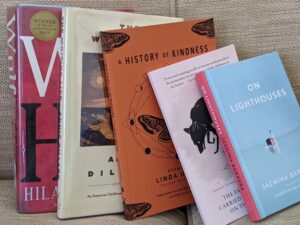My reading topped forty books in 2020—a pandemic plus. The list revealed categories, from which I’ve picked highlights.
Books on writing
The Writing Life, Annie Dillard
On estimation of a work in progress: “The feeling that the work is magnificent and the feeling that is it abominable, are both mosquitoes to be repelled, ignored, or killed, but not indulged.”
“…writing sentences is difficult whatever their subject. It is no less difficult to write sentences in a recipe than sentences in Moby-Dick. So you might as well write Moby-Dick.”
Dillard is high-minded, takes no prisoners. If you’re prepared to lay down your life to write, read and follow.
Post-apocalyptic fiction
Broken Earth Trilogy, N.K. Jemisin. I finished The Stone Sky, Vol. 3, before the pandemic. Jemisin is my new hero, wrote most of this trilogy and the novels before it while working full time, finished Broken Earth while caring for her dying mother. She’s the first to win three consecutive Best Novel Hugo awards—not the first woman or the first black writer—the first period. (Ladies, please note: not married. No children. Two cats.)
Classics
Winesburg, Ohio, Sherwood Anderson; Go Tell it on the Mountain, James Baldwin; Spring and All, William Carlos Williams; One Hundred Years of Solitude, Gabriel García Márquez, Black Boy, Richard Wright, Solar Storms, Linda Hogan
Hogan’s novel appeared in 1995. History repeats, as with Covid and the 1918 epidemic, making Hogan prescient: “It happens that in a crisis, all of the time between one history and another falls away. It disappears and the two times come together, gathered as one. Remembered.”
Books change when you return to them years later. I didn’t remember how darkly funny García Márquez was, how much he improvised on and repeated the theme of solitude. I did remember the glory of his first sentence: “Many years later, as he faced the firing squad, Colonel Aureliano Buendía was to remember that distant afternoon when his father took him to discover ice.”
It was a good year to reread Baldwin and Wright. Born in 1908, Richard Wright felt himself wanting to become a writer, against all odds:
“I was building up in me a dream which the entire educational system of the South had been rigged to stifle. I was feeling the very thing that the state of Mississippi had spent millions of dollars to make sure that I would never feel; I was becoming aware of the thing that the Jim Crow laws had been drafted and passed to keep out of my consciousness…”
Translations
On Lighthouses, Jazmina Barrera, translated by Christina MacSweeney, a personal essay
Collecting is a form of escapism. By giving our attention—our desire, our will—to something outside ourselves, to its beauty, its order, its classification and accumulation, we’re distracted from lack and emptiness…Faced with the fear of an uncertain future—collect.
Posthumous Memoirs of Brás Cubas, Machado de Assis, a novel. You heard that right: the character Brás Cubas writes after death. Wickedly satirical. Translations are often updated. The formidable Gregory Rabassa translated it in 1997. This is the much-praised 2020 translation by the equally formidable Margaret Jull Costa and Robin Patterson.
For a Long Time, Afraid of the Night, Yasmine Ghata, translated from the French by Marjolijn de Jager, a novel. A moving tale of a child’s escape from the genocide in Rwanda, and his recovery from that past in France.
Memoir
What You Have Heard Is True: A Memoir of Witness and Resistance, Carolyn Forché
Forché tells her El Salvador mentor that poetry gets no respect in the U.S. This surprised him: “Well, you’ll have to change that. In my country and in the rest of Latin America, poets are taken seriously. They’re appointed to diplomatic posts, or they’re assassinated, or put into prison but, one way or the other, taken seriously.”
Heavy: An American Memoir, Kiese Laymon
“I read everything James Baldwin had written that summer. I learned you haven’t read anything if you’ve only read something once or twice. Reading things more than twice was the reader version of revision.”
The end of this memoir made me cry. Laymon deals in part with the issue of obesity among black folk, his own eating disorders included. A great American tragedy: a black man growing up in Mississippi in the 1970s – 1980s experiences racism, less oppressive versions of it but still the same racism Wright described sixty years earlier.
Historical Fiction
Wolf Hall, Hilary Mantel. The beginning of the Thomas Cromwell trilogy, a novel that immerses you in its world, in this case 1530s England, so you wake up thinking maybe we’ll go to see the heretic burned at the stake today, take the children.
Books by Former Students
This category proves 2020 had cause for celebration after all. The Winter Duke, Claire Eliza Bartlett; The Family that Carried Their House on Their Backs, Sammie Downing, both published this year.
Poetry
A History of Kindness, Poems by Linda Hogan.
The Current Veins of History
Are open/as worlds and borders redefine/themselves
From that poem, give a poet the last word:
…for just this moment can’t we touch one another/and ask about our lives?


A fine list, amiga! I read the even earlier translation of the Machado de Assis novel, done by William Grossman and published under the odd title of “Epitaph of a Small Winner.” It was terrific, and I’m tempted to read the Costa/Patterson version too, just because the book almost demands rereading. Linda Hogan’s “A History of Kindness” was a high point for me this year, too. I have this weird habit of NOT reading all the books of favorite authors, and García Márquez is a prime example. I’ve read everything of his in translation except “The General in His Labyrinth” and his memoir “Living to Tell the Tale”; it’s as if, by abstaining, I somehow prolong the life he has inside my life. Yep—I’m odd…. Thanks again!
Right, Joe. I had Grossman in there, but he fell beneath the blade of my self-imposed word limit. Also a respectable translator. And, I picked up the Machado de Assis in the first place because you mentioned it earlier this year. What would be instructive, at least for a translator, is to read all three English versions side by side. Also Linda Hogan: she just keeps writing great stuff, doesn’t she?
Thanks for this, Pat.
This reminds me, I need to reread Annie Dillard.
Here’s to rich reading in 2021!
Great list, Pat, thanks for the descriptions. I have the Broken Earth trilogy but haven’t been able to dive into it; perhaps you’ve provided some motivation. I’ll make sure Gerri sees this too.
Thanks, Bob! I read two other post-apocalyptic novels during the year, but hers was by far the best, in world-building, character development, themes easily related to present societal ills, the slow, over three volumes, revelations of the plot. It took me a while, starting sometime in 2019, to read all three.